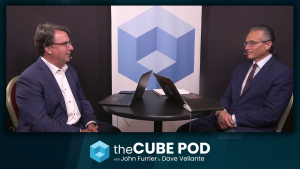FalconStor: In Eclipse or Poised for Growth?
A high-growth startup in the first decade of the new century, data backup solution vendor FalconStor has stalled financially in the last two years, admits company VP of Worldwide Marketing Fadi Albatal. An early developer of disk storage virtualization, it was known for its Virtual Tape Library technology that automates data backup to SATA disk systems rather than tape with in-line deduplication to make the disk choice more affordable.
Twelve years after its founding in 2000, the technology is still considered innovative and remains a market leader in disk-based data protection as its listing in CRM’s 2012 Virtualization 100 List demonstrates. Experts agree that its technology is well designed, and it has worked steadily to expand its markets, for instance by bringing out a plug-and-play backup appliance that includes internal disk for the SMB market. On the back end it supports replication to tape, remote sites, and public cloud Storage-as-a-Service vendors.
So why is it not growing? The answer lies in a shift in its strategy. Initially FalconStor got much of its growth through OEM arrangements with major industry players. This gave the startup both access to large markets and the market validity to sell into them. But it also lost control over its own destiny. The problem with OEM relationships with industry giants is that when they decide to end the relationship, the startup is cut off from its markets with no independent brand recognition to build on, since its products were sold under the partner’s brand. This can crush promising companies, as entrepreneurs discovered to their sorrow.
FalconStor’s story is not that abrupt. But, Albatal admits, the OEM business that was the cornerstone of FalconStor’s success has been fading over the last two years. So far FalconStor has replaced that business by increasing its channel sales under its own brand, and in the last two quarters it has achieved a small net growth. And it has also converted some of its OEM arrangements into technical partnerships, with an impressive list of companies that include 3PAR, CA, Cisco, Dell, HDS, HP, Intel, Microsoft, Novell, and Oracle.
So is FalconStor fading or poised for new growth? The 2% revenue growth it reported for 1Q12 certainly is not a return to the big numbers it posted in its early years, but it does speak to the resilience of this company. And its remaining OEM partnerships – with DataDirect Networks, EMC, and Huawei Symantec among others – are still significant.
Albatal speaks confidently of the future. “We want to stabilize and perhaps start growing that OEM business again based on the relationships we have with major industry players. But overall we will continue to support our channel and our channel growth model.”
In reality, FalconStor appears to be at a critical point. The strategy Albatal describes can work, if the company executes flawlessly and if investors stay optimistic enough that its market cap doesn’t shrink. But in reality as a small company playing among the storage giants, its future depends in large part on what those giants do. So far it has been protected in part because the market for disk backup systems is immature. But as that market grows, as it inevitably will if not now then in the future as SATA disk costs decrease and the cost of workflow interruptions caused by data corruption problems as well as major disasters increases, those giants will eventually notice. Then it must face competition from companies with many times its marketing and sales resources. The choices then will be either to find allies who will not choose to develop their own products, sell itself to one of those giants, or find a defensible niche market.
A message from John Furrier, co-founder of SiliconANGLE:
Your vote of support is important to us and it helps us keep the content FREE.
One click below supports our mission to provide free, deep, and relevant content.
Join our community on YouTube
Join the community that includes more than 15,000 #CubeAlumni experts, including Amazon.com CEO Andy Jassy, Dell Technologies founder and CEO Michael Dell, Intel CEO Pat Gelsinger, and many more luminaries and experts.
THANK YOU









